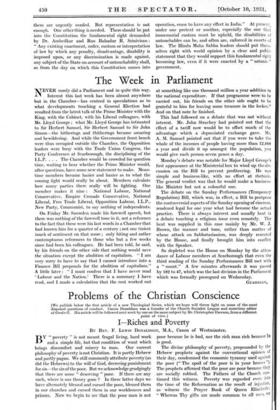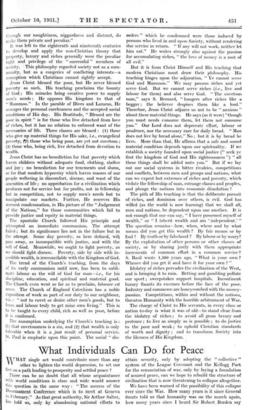Problems of the Christian Conscience [We publish below the first
article of a new Theological Series, which we hope will throw light on some of the most disputed questions of conduct. Canon Donaldson was a founder of the Church Socialist League and sometime editor of Goodwill. His article will be followed next week by one on the same subject by Mr. Christopher Dawson, from a different point of view.]
I—Riches and Poverty
BY REV. F. LEWIS
DONALDSON, M.A., Canon of Westminster: BY " poverty " is not meant frugal living, hard work and a simple life, but that condition of want which brings discomfort and misery to man. Our current philosophy of poverty is not Christian. It is partly Hebrew and partly pagan. We still commonly attribute poverty (as did the Hebrews) to the will of God, decreeing punishment for sin—the sin of the poor. But we acknowledge grudgingly that there are some " deserving " poor. If there are any such, where is our theory gone ? In these latter days we have alternately blessed and cursed the poor, blessed them in our churches and cursed them in our workhouses and prisons. Now we begin to see that the poor man is not poor because he is bad, nor the rich man rich because he is good.
The divine philosophy of poverty, propounded by the Hebrew prophets against the conventional opinion of their day, condemned the economic tyranny used against the poor (" The spoil of the poor is in your houses "). The prophets affirmed that the poor are poor because they are socially robbed. The Fathers of the Church con- tinued this witness. Poverty was regarded even into the time of the Reformation as the result of injustice, as • witness the Prayer Book of Queen Elizabeth: " Whereas Thy gifts are made common to all men, ive through our naughtiness, niggardness and distrust, do make them private and peculiar."
It was left to the eighteenth and nineteenth centuries to develop and apply the non-Christian theory that property, luxury and riches generally were the peculiar right and privilege of the " successful " members of society. • This philosophy regarded society not as a com- munity, but as a congeries of conflicting interests—a conception which Christians cannot rightly accept: Jesus Christ blessed the poor, but He never blessed poverty as such. His teaching proclaims the bounty of God ; His miracles bring creative power to supply men's needs ; He opposes His kingdom to that of " Mammon." In the parable of Dives and Lazarus, He scourges the personal carelessness and the accepted social conditions of His day. His Beatitude, " Blessed are the poor in spirit " is for those who live detached from love of riches, but it has no relation to • enforced want of the necessaries- of life. Three classes are blessed : (1) those who give up material things for His sake, i.e., evangelical poverty, (t) those who being poor, are yet not covetous ; (3) those who, being rich, live detached from devotion to wealth.
Jesus Christ has no benediction for that poverty which leaves children without adequate food, clothing, shelter and joy ; no benediction for our tenements and slums, or for that modern hypocrisy which leaves masses of our people weltering in discomfort, disease, and want of the amenities of life ; no approbation for a civilization which produces not for service but for profits, net in fellowship but in competition, not to supply men's needs but to manipulate our markets. Further, He reserves His sternest condemnation, in His picture of the "Judgement of the Nations," for those communities which fail to provide justice and equity in material things.
The apostolic Church followed His principle and attempted an immediate communism. The attempt failed ; but its significance lies not in the failure but in the attempt. Some day poverty, as here defined, will pass away, as incompatible with justice, and with the will of God. Meanwhile, we ought to fight poverty, as we should fight disease. Poverty, side by side with in- credible wealth, is irreconcilable with the Kingdom of God. The trend of the Church's teaching, from the days of its early communism until now, has been to subli- mate labour as the will of God for man—i.e., for his discipline, education, and spiritual and material good.
The Church even went so far as to proclaim, laborare est orare. The Church of England Catechism has a noble exposition of work as part of our duty to our neighbour, viz. : " not to covet or desire other men's goods, but to learn and labour truly to get mine own living." This is to be taught to every child, rich as well as poor, before it is confirmed.
The assumption underlying the Church's teaching is : (1) that covetousness is a sin, and (2) that wealth, is only tolerable when it is a just result of personal service. St. Paul is emphatic upon this point. The social " dis- orders " which he condemned were those induced by persons who lived in and upon Society, without rendering due service in return. " If any will not work, neither let him eat." He writes strongly also against the passion for accumulating riches, " the love of money is a root of all evil."
But it is from Christ Himself and His teaching that modern Christians must draw their philosophy. His teaching hinges upon the adjuration, " Ye cannot serve God and Mammon." We may possess riches and yet serve God. But we cannot serve riches (i.e., live and labour for them) and also serve God. " The covetous man," says S. Bernard, " hungers after riches like a beggar ; the believer despises them like a lord." Therefore, Jesus Christ adjures us not to be " anxious " about these material things. He says (as it were) "though you must needs consume them, let them not consume you." Our Lord does not deprecate effort, labour or prudence, nor the necessary care for daily bread. " Man does not live by bread alone," No ; but it is by bread he lives. More than that, He affirms that a safe and sound material condition depends upon our spirituality. If we establish a society founded upon social justice (" seek ye first the kingdom of God and His righteousness ") " all these things shall be added unto you." But if we lay out our social systems in bitter rivalries, competitions and conflicts, between men and groups and nations, what can we expect but extremes of riches and poverty, which violate the fellowship of man, estrange classes and peoples, and plunge the nations into economic dissolution ?
The pith of His teaching is that the deliberate pursuit of riches, and dominion over others, is evil. God has willed (as the world is now learning) that we shall all, men and nations, be dependent upon one another. It is not enough that one can say, " I have possessed myself of wealth," or " I inherit wealth and am ' independent.' " The question remains—how, when, where and by what means did you get this wealth ? By fair means or by foul ? By truth or by falsehood ? By labour or by usury? By the exploitation of other persons or other classes of society, or by sharing justly with them appropriate increments of common effort in a common service ? S. Basil wrote 1,500 years ago, " What is your own ? Whence did you get it and have it for your own ? "
Idolatry of riches pervades the civilization of the West, and is bringing it to ruin. Betting and gambling pollute our sport ; sweepstakes support hospitals. Incontinent luxury flaunts its excesses before the face of the poor. Industry and commerce are honeycombed with the money- passion. Competitions, within and without the nations, threaten Humanity with the horrible arbitrament of War.
The charge of Christ to His servants, in every class or nation to-day is what it was of old—to stand clear from the idolatry of riches ; to avoid all gross luxury and pretence ; to live as simply as is possible ; to do justice to the poor and weak ; to uphold Christian standards of worth and dignity ; and to transform Society into the likeness of His Kingdom.



















































 Previous page
Previous page